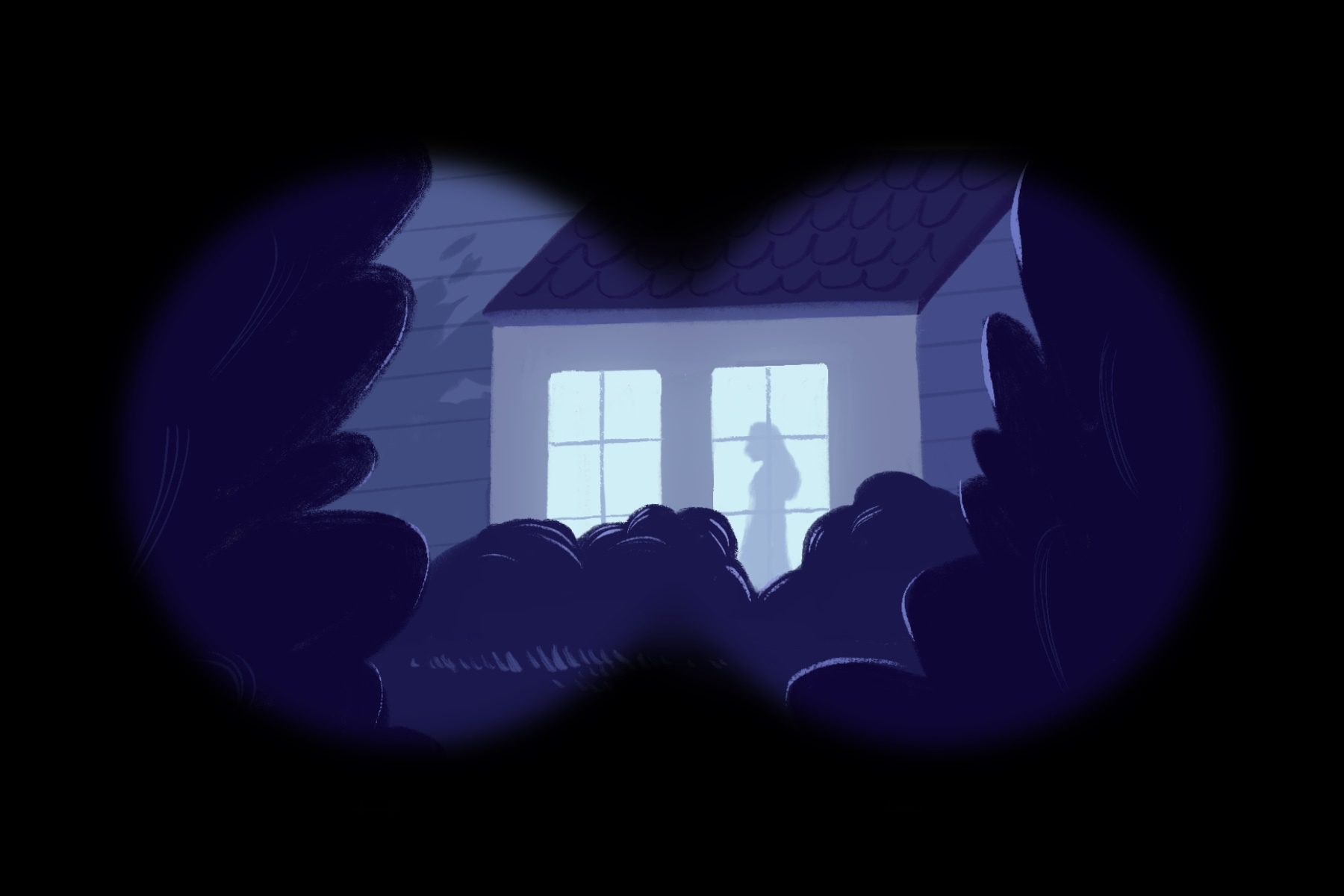At least once or twice a month, a message arrives in T.K. Logan’s inbox: A stranger, often a woman, is being stalked and can’t find anyone to help.
“Victim after victim, they email me,” said Logan, a professor at the University of Kentucky College of Medicine who researches trauma and interpersonal violence. “One last night came in. ‘No one will help me, I’ll go out of state, I just want one person to talk to.’”
But in many ways, Logan’s hands are tied, too. “I’m just a researcher – I’m not a victim advocate.”
Stalking, or repeated conduct that would cause a reasonable person to be afraid, including threats, non-consensual communication or physical proximity, has long been an under-researched, underreported and under-convicted crime — and experts are worried that the outlook for survivors has still not improved.
Being stalked can erode a person’s sense of safety, trust in others and well-being as they fear being harmed or that their loved ones will be harmed. Surviving stalking, and struggling with feelings of shame surrounding it, are linked to symptoms associated with PTSD, depression and anxiety. Dealing with its aftermath can drain resources and future opportunities, lead to severed social connections, and heightened isolation.
Experts say progress has been made in recent years to make more technologically-savvy safety plans with survivors and to understand cyberstalking, as well as links to domestic violence and the harms beyond physical assault. But survivors are still struggling, and researchers are tasked with filling major information gaps to understand what they’re going through — and to hopefully get them help.
“To me, victims suffer in silence,” said Logan, who spent about two decades on her research. “That hasn’t really changed throughout my career.”
Later, over email, she added: “I am limited in what I can do.”
Nearly 1 in 3 women and about 1 in 6 men are stalked at some point during their lifetimes, according to CDC data from the National Intimate Partner and Sexual Violence Survey. Most stalking perpetrators are men – but when the person being stalked is a man, societal expectations around gender mean he’s less likely to be believed.
Police need more training to understand a methodical crime that requires tracking a pattern of behavior that may appear ordinary on the surface, experts say — and survivors need to be affirmed by the people they share their story with in order to seek help and resources in the first place.
“People have a fear that they won’t be believed,” said Christina Dardis, an assistant professor at Towson University who specializes in interpersonal violence. “They fear they’ll be retaliated against if the police bring some type of action. They worry that the response won’t be fast enough or sufficient enough or lead to strong enough charges. And in reality, we see some of that play out,” she said.
While Dardis said the field has seen significant progress in understanding stalking as a form of intimate partner violence, she hopes future research will focus on solutions on how to prevent stalking and support survivors.
Stalking statutes and the evidence required to charge someone vary widely by state, according to the Stalking Prevention, Awareness, and Resource Center (SPARC), although most states require the behavior to be targeted and to cause or be intended to cause some level of emotional distress or fear.
Gathering evidence of stalking can feel like “another full-time job” on top of handling the trauma and daily life, Dardis said — it’s exhausting, so some survivors don’t formally report what’s happening to them.
Tammy Quetot, a 56-year-old self-defense instructor who previously worked for the Department of Defense at Fort Knox, was stalked beginning in 2015, she told The 19th. She worked for years to gather evidence, but it still wasn’t enough. By sharing her story, including with the Kentucky attorney general’s office and a local domestic and sexual violence prevention coalition, Quetot hopes other survivors feel empowered to share.
“My life is still affected so much by what happened to me,” she said. Quetot goes to therapy and undergoes transcranial magnetic stimulation (TMS) treatments for PTSD, the latter of which is running up copays not covered by insurance.
“I was so upset. I lost over 50 pounds. … I literally could feel my body eating itself,” she said. Taking up self-defense and firearm training, as well as finally feeling ready to share her story, are what helped her heal and feel secure. Now, she doesn’t live in fear, she said.
More investment into stalking research is sorely needed, experts say — especially for LGBTQ+ people. The CDC in 2010 found that bisexual women were disproportionately exposed to intimate partner violence and stalking.
Being stalked as an LGBTQ+ person also presents additional barriers to accessing help and resources, said Katie Edwards, associate professor of counseling psychology at the University of Nebraska-Lincoln. On top of victim-blaming that many survivors deal with, an LGBTQ+ person may also be exposed to homophobia or transphobia while reporting the crime, may not even be out, or may not want to make the community overall look bad, she said.
“We know so little about stalking among LGBTQ+ individuals, and what little bit we do know from research, we know that it’s a pervasive problem,” she said.
In a paper that aims to understand the breadth of current research on how stalking affects LGBTQ+ people, which is currently under peer review, Edwards and her colleagues could find only 11 published articles examining the stalking experiences of LGBTQ+ people — out of over 250 peer-reviewed articles and government reports.
The research “just doesn’t exist,” she said. “It’s really, really alarming.”
Little is known about stalkers in general, like what stops stalking and what starts it, and Logan noted that even with more research into why stalking takes place, answering that question may ultimately never be possible.
While there isn’t one set of guidance that can stop stalking, especially since it depends on the particular stalker, experts say there are still steps that have worked for some.
Quickly and strongly letting the stalker know that their contact is unwelcome, blocking them by phone and on social media, and changing daily routines can work as an early deterrent, said Jill Smialek, who manages walk-in services and victim advocates at the Victim Service Center & Family Justice Center in Cleveland. She has worked in victim advocacy since 2010.
“That hopefully will stop the other person in their tracks,” she said. However, if the person is threatening you or is otherwise threatening harm, go straight to the police, she said.
If the stalker is not a direct threat, the second phase would be to tell friends, family members and coworkers that this person is not supposed to be in contact — and to pass along word if they see the stalker.
Step three is to start documenting in preparation for talking to the police, Smialek said.
Experts recommend using online best practices, with strong passwords for accounts. Consider setting cellphones to factory settings to eliminate spyware, Dardis said, and turning off Bluetooth and location services, and maybe creating a Google Voice phone number.
More resources — including guides for advocates and friends of victims, international organizations to reach out to, helplines and resources for survivors like stalking behavior logs, are available online. Quetot also contributed to a guidebook to help friends and family support survivors, alongside the local Domestic and Sexual Violence Prevention Coalition.
The need for further research into stalking — and more training for those in power who have the opportunity to recognize and stop it — is all the more important due to links between stalking and other forms of violence, like domestic abuse and sexual assault.
In a peer-reviewed 2017 study of eight years’ worth of 911 calls to the Houston Police Department, researchers found that out of about 3,700 stalking calls, only 66 reports and 12 arrests were made.
The end of a domestic violence relationship can signal the beginning of a stalking relationship for many victims, Smialek said.
For many survivors of stalking and abuse, the first person they tell isn’t law enforcement or a source of authority — it’s a close friend or family member. And if that loved one doesn’t validate the survivor, it can drastically affect their mental health and whether they report the crime at all, experts say.
“Start by believing,” Logan said. “It doesn’t matter how unbelievable the story sounds, and it probably is going to sound unbelievable, because it is just so counter to normal behavior in society.” She reflected that several victims told her that after friends or family discounted their experiences, “they didn’t tell anyone again for years.”
After the stalking started, Quetot suppressed the trauma and emotion and kept it quiet for a whole year. She wishes now she would have told someone sooner — and thinks not telling anyone greatly contributed to her trauma.
“It wasn’t until I realized that I couldn’t handle my trauma by myself that I began to heal,” she said. “And that’s when I started reaching out to people, sharing my story.” Another power that comes from sharing is hearing other people say, “Oh, me too,” she said.






